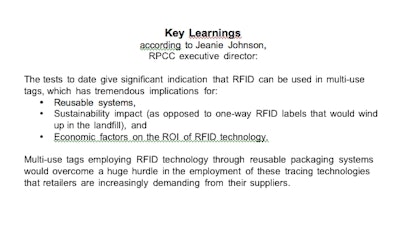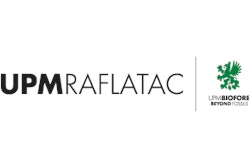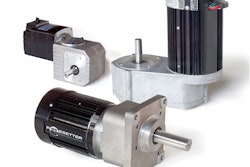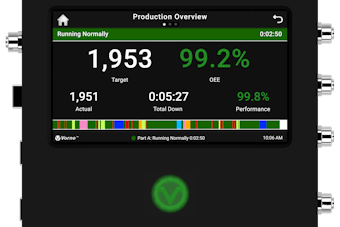
The groundbreaking study is supported by a broad group of RPCC members and industry leaders throughout the supply chain. The participants include growers Tanimura and Antle, Stemilt, and Frontera, Wal-Mart, and packaging or RFID vendors The Kennedy Group, Avery Dennison, Alien, UPM Raflatac, Impinj, IFCO Systems, Georgia-Pacific, and ORBIS.
Thousands of reusable plastic containers (RPCs) with affixed RFID tags are being tested throughout the supply chain, grower fields to distribution centers to retailers.
"There has never been an RFID-related field trial of this magnitude in the United States with so many key supply chain partners," said Fred Heptinstall of IFCO Systems, and RPCC president. "The level of cooperation within the industry is truly remarkable. And if the field trial results mirror the data from the laboratory testing, we will prove unequivocally that reusables are the enabler to the cost-effective use of RFID technology."
This large-scale field trial follows rigorous laboratory testing at Michigan State University School of Packaging. During the laboratory trial, 230 reusable containers with nine different EPCglobal (www.epcglobalinc.org)-compliant Gen 2 RFID tags were vigorously tested at MSU. The three tags that performed optimally during the testing are currently being used in the field trial. Packaging World has learned that those are Gen 2-compliant tags from Alien, UPM Ralflatac, and Avery-Dennison. No further details were provided.
Readability tests were conducted by CalPoly scientist Dr. Jay Singh at a second laboratory and results were verified by third-party advisors. The project team performed more than 160 hours of testing and more than 14,000 tests. The containers were subjected to vibration and drop tests as well as repeated cleaning and handling. In addition to proving durability, the data demonstrated that it is possible to get 100 percent read rates 100 percent of the time, which has never been achieved in the industry before.
“The durability and readability of the RFID tags during the lab tests were superb,” said Pat Kennedy of The Kennedy Group, and the RPCC Project Leader. “The information gathered from these studies will help businesses make data-driven decisions about the cost effectiveness and feasibility of incorporating reusable containers into their supply chains from an enhanced track and trace perspective.”
Other key learnings were shared by Jeanie Johnson, RPCC executive director (see graphic).
In the current field trial, the RPCs with the multi-cycle RFID tags are being used in grower fields in Washington and California. From there, produce in the containers is shipped to Wal-Mart distribution centers, where the produce is cleaned and the containers and tags are subject to washing, further handling, refrigeration, and storage before being sent to retail stores.
Eventually, the RPCs—from IFCO, Orbis, and GP— are collapsed and sent back through the supply chain for further cleaning, handling, and storage. Each container is going through a minimum of three cycles of use. At the end of each cycle, the RFID tags are being tested for viability, then re-encoded for the next cycle. The six-month field trial is expected to end in spring 2008.


























